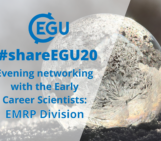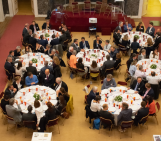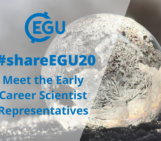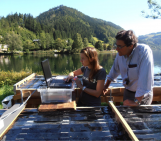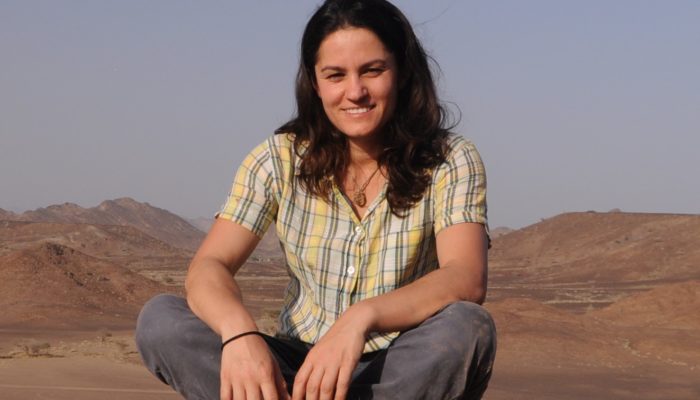
Hi Anita. Thank you for joining us today! Before we jump in, could you tell us a bit about yourself and your career?
I am a postdoctoral researcher between the INGV in Rome and Scripps Institution of Oceanography. I am from Palermo, in Italy, and did my PhD in Rome; then I lived in Brazil, the UK, and the US during my past four postdoctoral projects. I work as a paleomagnetist to refine our understanding of the origin and evolution of the Earth’s magnetic field, with applications to volcanology, archeology, and paleoclimatic studies.
You’re the current Union-level Early Career Scientist (ECS) Representative. For readers who might not be familiar with the Union’s ECS community, could you describe who the ECS are and your role in the community?
An Early Career Scientist, or ECS, is a student, a PhD candidate, or a practising scientist who received their highest certificate (e.g. BSc, MSc or PhD) within the past seven years. This definition includes career breaks for any reason, from caring responsibility or periods of work outside academia. I am the current ECS Representative at the Union level and in this role, I represent and coordinate with the other 22 ECS Representatives (Reps) of the 22 EGU Divisions. With the Division Reps, we meet about every 6 or 7 weeks for updates on activities (e.g. webinars, campfires…) and the needs of each Division, and the five active ECS-led working groups (Work-Life Balance, Jobs and Careers, Medals and Awards, Connectivity and Pride groups). My role is to facilitate communication to the EGU Council, both voicing ECS needs and ideas, and conveying discussions and decisions to the ECS Reps. To this end, last September we organized for the first time a joint meeting with the Council members and the ECS Reps. During the year in this role, I also participate in the meetings of the Outreach Committee, the Equality Diversity and Inclusion group and some of the Program Committee meetings. The meetings intensify in preparation for the General Assembly where I coordinate, with the help of the incoming Union Rep, a series of networking and short courses for the ECS EGU community and co-coordinate the Short Course schedule.
ECS Representatives have delivered a cornucopia of ECS content at previous General Assemblies, from short courses to networking opportunities. What types of events should ECS members be looking out for at a General Assembly?
In the past two years, the General Assembly was organized online due to the pandemic. The ECS organized a number of networking events both at Union-level and at Division-level, as well as Great Debates, Short Courses, and pop-up events to allow for more discussion and networking time between the invited speakers and the ECS community. These events multiplied compared to the past in-person General Assemblies, both to compensate for the lack of in-person networking opportunities and for the new spontaneous aspect of online events and tools. This year the GA is organized in a hybrid format, which will include both an in-person and online programme, providing a unique opportunity to all participants to enjoy what the conference has to offer for the ECS community. This format can be considered more inclusive and facilitate the participation of EGU members who otherwise would not have had the opportunity, time or resources. For EGU22, the ECS community can look out for the networking events (NET, in the programme) organized by and for ECS, and in particular the ECS Forum, a number of short courses (SC, in the programme), Great Debates (GDB) and pop-up events. For the in-person participants, the networking and pop-up events could be either on-site (inside the VIC) or virtual. First time attendees and ECS can also benefit from signing up to a mentoring program to be paired with a mentor. Finally, the ECS community is welcome to visit the EGU and the EDI booths to meet and communicate with EGU volunteers.
You’re also involved in the Union’s Equality, Diversity, and Inclusion Working Group and EGU Pride. What made you feel passionate about volunteering your time for EDI work?
Yes, I am. My passion sparked from my own experience and that of my close colleagues, experiencing some form of discrimination or harassment during their career. The mindset of victim blaming would ‘justify’ such incidents as the person have some form of perceived misalignment with the status quo, say along social, sexual, or racial identities. The topics covered by the EDI group encompass some of these aspects and I am glad I can volunteer my time to work for an inclusive working environment. Within EGU, some ECS members and myself started a Pride group two years ago, to work towards creating a more inclusive General Assembly and a space for the LBTQIA+ community to virtually meet during the year. During this General Assembly, ECS can keep an eye for networking organized by the Pride group for the LBTQIA+ community. The EDI group is convening sessions and great debates focused on EDI topics and is organizing the screening of a movie and pop-up events. The EDI group will have a dedicated booth for in-person participants, which everyone is welcome to visit.
Finally, how can those wanting to engage with the ECS community get involved?
Every ECS is welcome to connect with the ECS Division representatives and myself. We are reachable via email and social media such as Twitter, where each Division account has the format @EGU_DivisionName (e.g., @EGU_EMRP), or Facebook. There are a number of ways for an ECS to engage with the ECS community, from blog writing, to organizing a campfire (a non-recorded online event around a topic of choice), or a webinar (a recorded online event around a topic of choice), or become part of one of the five ECS-led working groups. ECS are welcome to become an active part of the ECS Division level structure in roles of officer, secretary, blog editor, event coordinator, and so on. Importantly what is desired is the passion to become part of the EGU community rather than having previous relevant experiences. Getting involved in the ECS EGU community is a great opportunity to foster a sense of belonging, learn new skills, and increase a support network, despite or because of the past two years of the pandemic.

